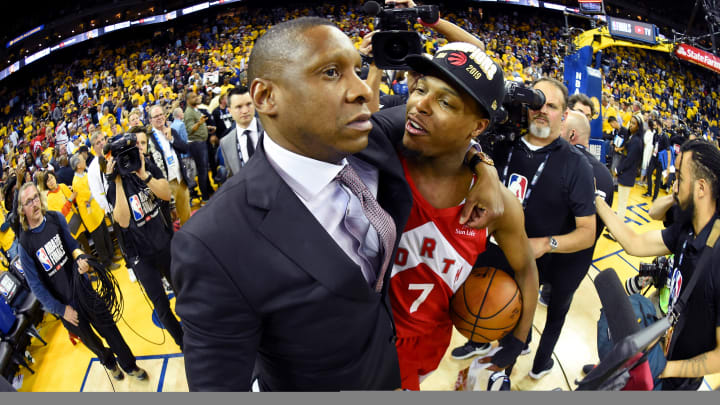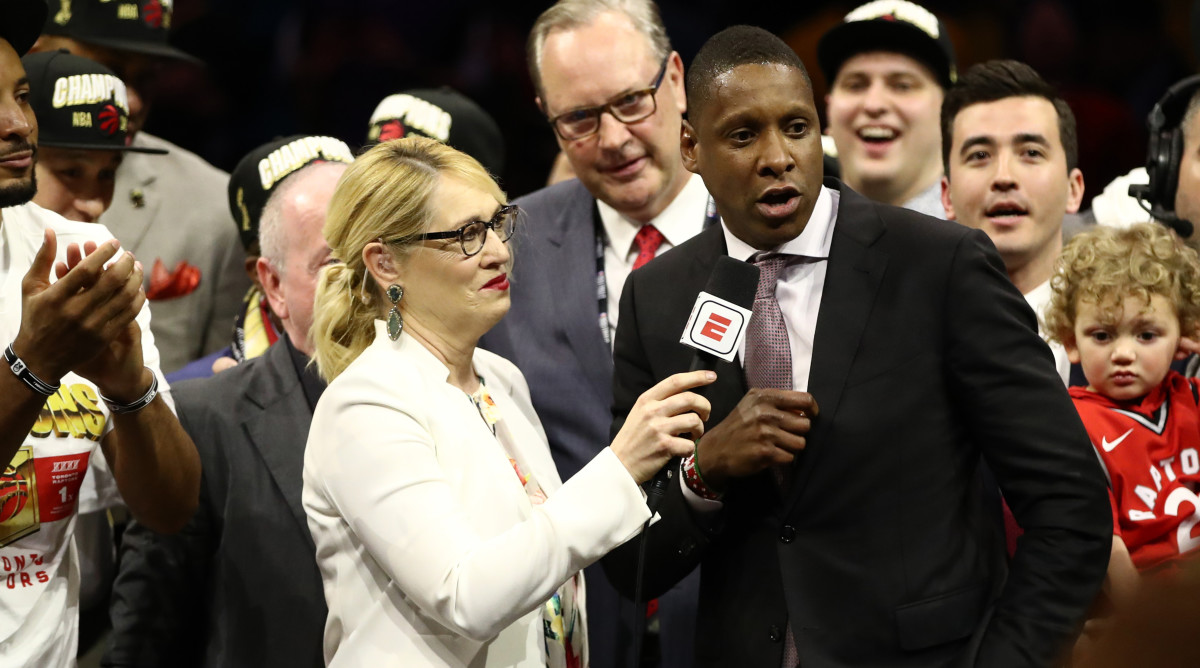The Potential Fallout From Masai Ujiri's Finals Run-In With a Sheriff's Deputy

Thursday evening was a night that Toronto Raptors president of basketball operations Masai Ujiri will never forget.
His Raptors won their first NBA title by defeating the two-time defending champion Golden State Warriors in Game 6 on the Warriors’ home court. The victory validated the wisdom of Ujiri’s bold roster moves, most notably his controversial trade last July of DeMar DeRozan, Jakob Poeltl and a first-round pick to the San Antonio Spurs for Kawhi Leonard and Danny Green. Leonard was named the 2019 Final’s MVP.
Then, almost immediately after the game, ESPN’s Adrian Wojnarowski broke news that the Washington Wizards plan to offer Ujiri as much as $10 million a year, plus possible equity in the franchise, to leave the Raptors and take over the Wizards. Per Wojnarowski, Wizards owner Ted Leonsis will seek formal permission from the Raptors to speak with Ujiri. If the Raptors grant permission and if Ujiri accepts an offer along the lines reported by Wojnarowski, Ujiri would become one of the highest compensated executives in U.S. sports, let alone the NBA.
Ujiri’s night was also memorable for a reason that he’d like to forget—and one that could pose legal problems for him and lead the NBA to discipline the 48-year-old recipient of the 2013 NBA executive of the year award.
As first reported by NBC Bay Area’s Kristofer Noceda and Gonzo Rojas, Ujiri is accused of striking an Alameda County Sheriff’s deputy in the face after he refused to let Ujiri onto the court to join in his team’s celebration.
A spokesperson for the Sheriff’s Office told NBC that the deputy, who available video suggests is a middle-aged male but who has not been identified, asked to see Ujiri’s credential before allowing him onto the court. Also, the deputy allegedly did not recognize Ujiri. The spokesperson claims that Ujiri refused to show a credential and then attempted to move past the deputy. The deputy, clearly agitated, in turn pushed Ujiri back.
After some apparent jostling between the men, Ujiri allegedly struck the deputy in the face. Several bystanders then attempted to separate the two men. The video shows one of those bystanders, a man wearing a green sweater, playing a peacemaking role by separating two deputies—a second had arrived—from Ujiri.
No injuries were reported, and Ujiri joined his team on the court for the celebration. For now, at least, no video has surfaced showing Ujiri and the deputy making any physical contact. The only video currently available is the one showing the man in the green sweater standing far between Ujiri and two deputies.

Competing arguments on where to place blame
It’s not clear why the deputy didn’t recognize Ujiri, who stands 6’4", was wearing a full suit and was probably being called by players, coaches and staff to join them on the court. At least in NBA circles, Ujiri is a highly-recognizable figure. He has also gained significant media attention during the finals. The deputy works in Oakland and might not be an NBA fan or at least not one who is familiar with the Raptors. Still, it stands to reason that security at games would familiarize themselves with the appearances of high-ranking persons from each team in order to avoid these kinds of situations.
Also, additional information surfaced on Friday that contradicts the Sheriff’s Office depiction of events. A season ticket holder named Greg Wiener toldAssociated Press bureau chief Rob Gillies that the deputy did not ask Ujiri for his credential and that Ujiri didn’t hit the deputy. Further, imagery provided by Kyle Neubeck of The Philly Voice shows Ujiri holding what appears to be his credential at the time of the incident. Whether Ujiri “showed” the credential upon the deputy’s request—and whether Ujiri needed to affirmatively show a credential that was already visible—could become important sources of debate.
But there are two sides to every argument. Assuming the deputy's account is accurate, and assuming Ujiri did not provide his credential, the deputy could rightly stress that “rules are the rules”, and that pursuant to those rules, no one is allowed to walk onto the court without a credential. The deputy might also highlight that if he allowed onto the court a person who “looked like” an important figure, but who in reality was not, and then an incident then ensued, the deputy would be rightly blamed. Likewise, the deputy could be accused of giving preferential treatment to persons who are dressed more formally.
The NBA, for its part, has firmly stressed courtside security ever since 2004. That was the year when the “Malice at the Palace” occurred. The “Malice” involved Indiana Pacers forward Ron Artest (now known as Metta World Peace) and other players battling with Detroit Pistons fans at the Palace of Auburn Hills.
Along those lines, this was the second physical incident in the 2019 Finals involving a team executive inside the Oracle Arena. During Game 3, Warriors minority owner Mark Stevens shoved Raptors guard Kyle Lowry. The NBA has fined Stevens $500,000 and banned him from attending any NBA games until the conclusion of the 2019-20 NBA playoffs.
Ujiri could be charged but also have his own legal claims
Ujiri was not arrested Thursday evening. However, the Sheriff’s Office says it will refer the matter to the Office of Alameda County District Attorney Nancy O’Malley and on Friday USA Today’s Dan Wolken reports that the Sheriff’s Office is actively pursuing a charge. The DA’s office will review available video and imagery and also attempt to speak with witnesses, one of whom almost certainly would be Ujiri. while other likely witnesses would include persons who were in close proximity to the incident.
If Ujiri is charged with a crime, the most likely offense would be a misdemeanor violation of California Penal Code Section 243(b). This section of the code contemplates simple battery against a peace officer, including when the peace officer is off-duty and employed in a private capacity. Simple battery is defined by California law as “any willful and unlawful use of force or violence upon the person of another.”
The maximum jail sentence for battery against an ordinary citizen is six months in jail. In contrast, the maximum jail sentence for battery against a peace officer (or a firefighter, lifeguard, EMT, animal control officer and certain other specified professions) and when the defendant knew or reasonably should have known that the victim was a peace officer (other specified profession) is one year in jail. This penalty can climb to three years when the battery causes the victim an injury requiring hospitalization. However, that enhancement mechanism does not seem applicable here since no injuries were reported or apparent.
Ujiri was obviously aware that the deputy was performing his duties since the deputy was wearing a uniform and clearly engaged in a work-related activity. Yet it remains to be seen if Ujiri—or more likely his attorney—offers a different account than the one expressed by the Sheriff’s Office, which is (obviously) not a neutral narrator. Ujiri could reveal additional information that reflects poorly on the deputy and suggest that he escalated the incident. Ujiri might also depict his actions as self-defense rather than those of an aggressor. Ujiri’s version could also provide him with his own legal claims against the deputy and the Sheriff’s Office, particularly if there are any allegations that connect with civil rights.
It’s also worth stressing that if Ujiri is charged and convicted, it’s unlikely he would face a year in jail or anything approaching it. He does not appear to have a criminal record and this incident did not lead to any injuries. In such a scenario, there’s a chance he would not receive any jail time.
To that point, if Ujiri is charged, his attorneys would likely try to resolve the matter through a plea deal that would only carry some combination of probation, a suspended sentence, community service, a fine or a public apology. A plea deal would also be designed to avoid any immigration law complications for Ujiri with respect to his travel in and out of the U.S.—a potential issue if the Nigerian native and Canadian resident is not a U.S. citizen.

Potential NBA sanction
The NBA carefully reviews all significant legal controversies involving players, coaches, team executives and owners. That practice will prove true here, as well.
Commissioner Adam Silver has substantial discretion under the league constitution to sanction team executives for behavior that reflects poorly on the league. Article 24 of the constitution permits Silver to take any action that he deems necessary for “the best interests of the Association.” Silver could also invoke Article 35A, which applies to team executives and forbids them from engaging in any “guilty of conduct prejudicial or detrimental to the Association.” Silver could indefinitely suspend a team executive or fine him or her up to $1 million.
If Silver believes that Ujiri struck the deputy without provocation or justification and if Silver surmises that this incident will damage the NBA’s image with fans, sponsors and media, he could decide to fine and/or suspend Ujiri. For now, though, expect the NBA to proceed cautiously and learn more facts before taking any action.
Michael McCann is SI’s Legal Analyst. He is also an attorney and Associate Dean of UNH Franklin Pierce School of Law.
